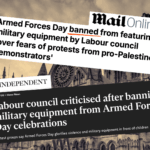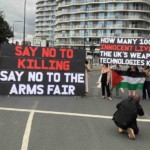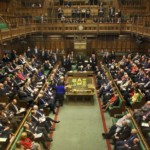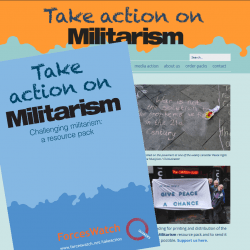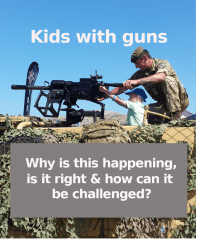Over the last 15 years, ForcesWatch has observed and responded to ways in which the military has been promoted as a normal part of everyday life. We believe that uncritical support for the armed forces stifles debate about alternatives to war and the enormous damage that is done to those involved in conflict.
In this period there have been many government initiatives – such as Armed Forces Day, promoting ‘military ethos’ in schools, the Cadet Expansion Programme and the Armed Forces Covenant – that seek to manufacture a climate of uncritical national pride in the armed forces in order to maintain recruitment levels and garner public support for defence and foreign policy. Policies promoting the interests of the armed forces are embedding the military into many of our civilian institutions.
To explore if changes in civil-military relations in recent years amount to a process of militarisation, we use the following to define militarism as:
- The normalisation of war and preparation for war.
- Prioritising the needs and interests of military institutions.
- Extension of military culture and influence into everyday life such as in education, central and local government and business, charities and other organisations.
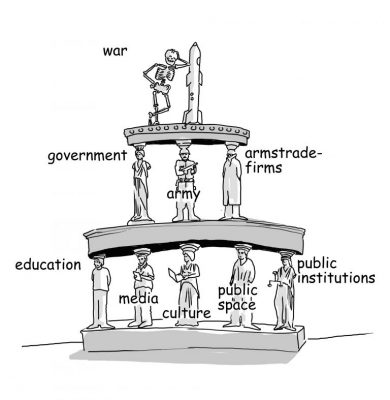
See more on ‘What is militarism?’‘
There is much evidence to indicate that these aspects of militarism have intensified. This ‘new tide of militarisation’ can be traced through policy and practice and adds up to a concerted effort by government and the armed forces, and supported by others, to promote the military, recruitment to the armed forces, defence spending and military approaches to conflict situations.
A new era of militarist realism
In the last few years we have seen a shift towards ‘integrating‘ defense – and militaristic approaches – into wider aspects of government, and plans to make more use of the military – and special forces which have no oversight in parliament – to respond to threats ‘below the threshold of war’.
The 2021 Integrated Review of Security, Defence, Development and Foreign Policy set out a dystopian vision of a country always preparing for war, further blurring the boundaries between military and civilian, and ‘between war and peace’. It also set out a policy of defence as an industrial strategy, linking it to the future prosperity of the UK.
With the start of the Ukraine war in 2022, ‘war-footing’ narratives from senior military figures, politicians and parts of the media in the UK have become mainstream. These have escalated with the threat of the US withdrawing defence support in Europe in 2025, with the UK government announcing ‘a new era of national security’ and a corresponding emphasis on developing the defence-led economy and addressing the ‘crisis’ in military recruitment.
For the UK government, linking its support for the military industries to its wider plan for ‘growth’, provides cover for a policy of ‘military keynesianism’ that is not supported by evidence. The question of whether the UK should be looking for prosperity from an industry and mindset that fuels death, destruction, surveillance and climate breakdown, is also unlikely to be addressed.
Read more on the ‘militarist realism’ of the Strategic Defence Review and National Security Strategy of 2025.
Useful resources
White Poppies for Schools
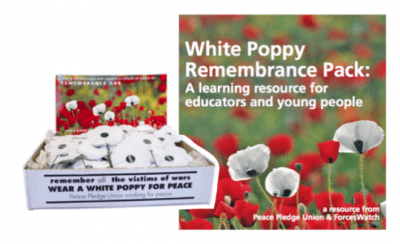 We have teamed up with the Peace Pledge Union to produce a White Poppy Schools Pack, which aims to explore Remembrance in a way that encourages critical thinking, and gives space for marginalised perspectives on war and peace.
The learning resource can be read online here, or purchased from the Peace Pledge Union as a bigger pack including white poppies and white poppy leaflets.
We have teamed up with the Peace Pledge Union to produce a White Poppy Schools Pack, which aims to explore Remembrance in a way that encourages critical thinking, and gives space for marginalised perspectives on war and peace.
The learning resource can be read online here, or purchased from the Peace Pledge Union as a bigger pack including white poppies and white poppy leaflets.
Warrior Nation: war, militarisation and British democracy – films
![]() These presentations were recorded at the launch of the report Warrior Nation: war, militarisation and British democracy by Paul Dixon (published by ForcesWatch) in June 2018 in London.
These presentations were recorded at the launch of the report Warrior Nation: war, militarisation and British democracy by Paul Dixon (published by ForcesWatch) in June 2018 in London.
- Warrior Nation: war, militarisation and British democracy, by Professor Paul Dixon
- Military Britain by Professor Joanna Bourke
- Militarism in public life in the UK, Emma Sangster, Coordinator of ForcesWatch
Warrior Nation: War, militarisation and British democracy
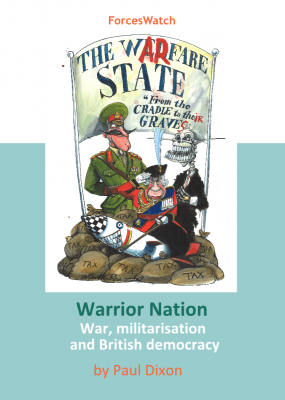 This report explores how the 'Militarisation Offensive' which started in 2006 to improve public recognition and support for the armed forces failed to produce majority support for the war in Afghanistan but deepened the militarisation of British politics and society. Since 2006 the military have broken constitutional convention and made public attacks on politicians, leading to the most severe tensions in political-military relations since the Second World War.
This report explores how the 'Militarisation Offensive' which started in 2006 to improve public recognition and support for the armed forces failed to produce majority support for the war in Afghanistan but deepened the militarisation of British politics and society. Since 2006 the military have broken constitutional convention and made public attacks on politicians, leading to the most severe tensions in political-military relations since the Second World War.
The new tide of militarisation
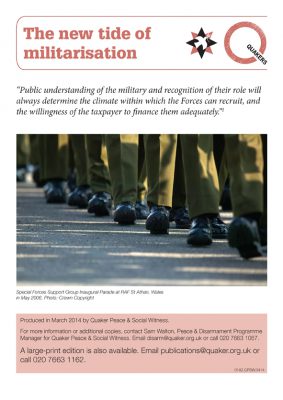 Militarism has existed in the Britain for a long time, but there is a new tide of militarisation that has developed over the last five years. This briefing from Quaker Peace and Social Witness, explores the government strategy to increase public support for the military, in order to raise the willingness of the public to pay for the military, make recruitment easier, and stifle opposition to unpopular wars.
Militarism has existed in the Britain for a long time, but there is a new tide of militarisation that has developed over the last five years. This briefing from Quaker Peace and Social Witness, explores the government strategy to increase public support for the military, in order to raise the willingness of the public to pay for the military, make recruitment easier, and stifle opposition to unpopular wars.
Taking action on militarism films
![]() Two short films from the Take Action on Militarism event.
Two short films from the Take Action on Militarism event.
Rethinking security
Take Action on Militarism: website and resource pack
 ForcesWatch have teamed up with Quaker Peace & Social Witness to produce a resource pack to help people take action on militarism in their communities. And there is a website to go with it where you can download the pack or order a hard copy, find links to more resources etc.
ForcesWatch have teamed up with Quaker Peace & Social Witness to produce a resource pack to help people take action on militarism in their communities. And there is a website to go with it where you can download the pack or order a hard copy, find links to more resources etc.
Why a white poppy?
Answering difficult questions about militarism
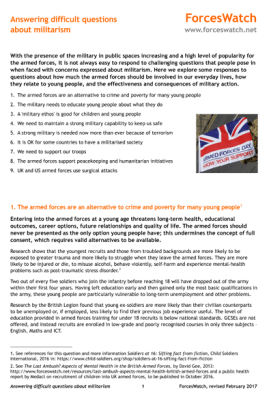 With the presence of the military in public spaces increasing and a high level of popularity for the armed forces, it is not always easy to respond to challenging questions that people pose in when faced with concerns expressed about militarism. In this briefing we explore some responses to questions about how much the armed forces should be involved in our everyday lives, how they relate to young people, and the effectiveness and consequences of military action.
With the presence of the military in public spaces increasing and a high level of popularity for the armed forces, it is not always easy to respond to challenging questions that people pose in when faced with concerns expressed about militarism. In this briefing we explore some responses to questions about how much the armed forces should be involved in our everyday lives, how they relate to young people, and the effectiveness and consequences of military action.
Spectacle, Reality, Resistance: Confronting a culture of militarism




